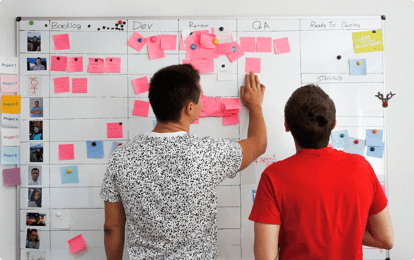Dmytro is a Quality Assurance Engineer at Codica. His task is to make sure the products we deliver to our customers run perfectly.
To get to where he is today, Dmytro had to turn a corner in his life. Like many others, he was conflicted about migrating from his initial profession into IT. But luckily, he got a chance to try a hand at software testing.
Is getting a Computer or Data Science degree a big deal to become a QA engineer? To inspire you, read this interview with a QA specialist who cut himself a path straight to our company.
Interview with a Quality Assurance Engineer
You used to be a construction engineer but ended up working in tech. What made you switch your career path?
The main reason was that my previous job didn't make me feel happy. It was as if I stood still, without progress, and this wildly distressed me.
Basically, I started off my QA career with almost zero knowledge about software development. I have to admit that back then I didn't even use the PC as my daily machine. I was inspired by mates who took their first steps into coding.
From buying goods to listening to podcasts, we're surrounded by software every day. When did it become clear to you that you were actually meant to work in tech?
The huge shift happened when I was testing an e-commerce platform at the beginning of my QA career. I liked it very much and realized how far I wanted to go. Of course, I got even more motivated since the tech field was growing in both salary and job volume. And then, I was fortunate enough to get on board of Codica, where I built up my professional skills.
How different is a QA engineer's way of thinking from a developer’s one?
It is like telling the same story differently. Some creative folks happen to be sensitive, treating code similar to “their child.” Perhaps it makes developers less objective when their work is to be tested.
Therefore, being a QA engineer, you need to know how to provide feedback on somebody else’s work, and it’s not that easy. It’s important to get along with other team members, because what gives me emotional chills every time I work on a project is a feeling of involvement. After all, we are a part of the team working towards the same goal — delivering awesome web products for our clients.
Recommended reading: How We Delivered MVP for PlanMyKids - Kids Activities Marketplace
So, I love being a part of a product development team, not just using my QA tester skills. Don't get me wrong; I love getting into the details and using logic. But I also enjoy the communication that the workplace brings into my life.

When you start a new job or shift careers, there's always a detail you wish you had known before. Ideally, you'd like to have a mentor who could save you time. But what should you know first and foremost to become a QA engineer?
The advice I'd give to my younger self is to deep dive into code immediately after choosing an IT career path. Your success in tech won't happen overnight. And getting a glimpse of programming languages is a good, if not the only, way to start this journey.
Since we are talking about code, could you name several beginner-friendly programming languages?
Well, it's not for me to talk about the low-entry technologies. Instead, I'll give you my personal top programming languages to learn in 2021.
Understanding CSS used in presentational HTML web markup makes daily tasks significantly easier. Such technologies aren't for coding. Instead, their use is like converting hand drawing into something more serious-looking.
Meanwhile, programming languages are used for building certain functionality. Speaking of which, I can't ignore JavaScript and Java. They have been and continue to be among the most in-demand languages on the market. So I'd highly recommend you to learn them, but not all at once, of course. Getting to know both CSS/HTML as well as JavaScript and Java is a perfect starting-off point in most cases.
Also, if you really need a beginner-friendly option, take a look at Ruby. It has elegant syntax and comes easy to pretty much everybody. Also, I was amazed by how little competition there is when it comes to Ruby.
Further reading: Pros & Cons of Using Ruby on Rails for Web Development
Anyhow, learning the languages I mentioned will definitely boost your productivity. Aside from understanding how code works, you will also be able to provide more correct time estimates when given a new task.
To develop your professional skills further, you decided to move to Kharkiv. The second-largest city of Ukraine hosts many leading IT companies in the state. How did you find out about Codica?
I already kept track of this company on the software consultancy market for a while. What caught my attention was marketplace development. That sounded very promising since nowadays many jump online to buy goods. And because I've been testing e-commerce websites from the very beginning of my QA career, Codica had a lot to offer.
So when I saw that Codica had an open position for a QA Engineer, I applied immediately.

What was Codica's recruitment process like?
It all started with a practical test. I was asked to make a QA checklist. So basically, I had to outline testing areas and tell if a product adheres to coding standards that promote quality solutions.
Later on, after I came to Codica's office, we were analyzing a couple of products, talking about what I'd do if I faced a certain problem. At some point, I was asked to switch to English to prove my language skills.
What kinds of testing do you perform on a daily basis? Can you tell us a little about them?
Codica uses both manual and automated types of software testing.
Manual testing is executed only manually which means — by a person. No assistance from tools or scripts is needed. That is why knowledge of scripts is less important but the process takes more time.
Automated testing requires automated software tools. The goal here is to perform repetitive tasks and regression tests without intervening manually.
Both approaches include integration, system, performance, and load testing. Selecting the type of testing can be due to factors that vary from budget and tech stack to project complexity.
What makes you feel good about working for Codica?
Becoming part of a Codica Team helped a lot to drive my career growth. Here, I've cultivated a passion for the craft and the work I perform these days.
I also admire Codica's product management. Though being organized is always good, it becomes crucial for the product managers as they lead projects. Also, I'm happy to admit that neither software QA engineers nor developers are micromanaged in this company.
Related reading: Agile at Codica: How We Deliver Great Web Products
Another thing is flexibility. I find it fascinating how easy it is to move within the domains. So your job never gets boring. Once you finish working on the automotive marketplace, you switch to an insurance app. To some extent, Codica is run like a yacht, but with a flagship, sail rigged up in the wind.
And I’m happy to be involved in the e-commerce domain, as one of Codica’ specializations is building custom marketplaces. For example, recently we were named a top e-commerce web development company. I’m proud of our achievements!
What advice would you give to someone considering starting a QA career right now?
To begin with, spend more time learning and practicing. There are opportunities for self-education out there. So if you put effort into it, you can successfully land your first job in a software development company.
If you don’t have a degree in computer science, you can still become a great QA Engineer. Thing is that delivering the quality assurance services, you will face challenges that require much creativity. This is something no one can be prepared for simply by having a diploma.
One more thing: learn English — you will definitely need it.
And last but not least: keep trying. This way, you will succeed. If this has not worked for you yet, give yourself a little more time.



![How We Built an Activity Booking Marketplace MVP [Case Study] | Codica How We Built an Activity Booking Marketplace MVP [Case Study] | Codica](/static/1f890fff707d1ec2ac5880d6d90a76e3/fd54a/90eb6dec5ee44140916f5c1edd3f65d1.jpg)



